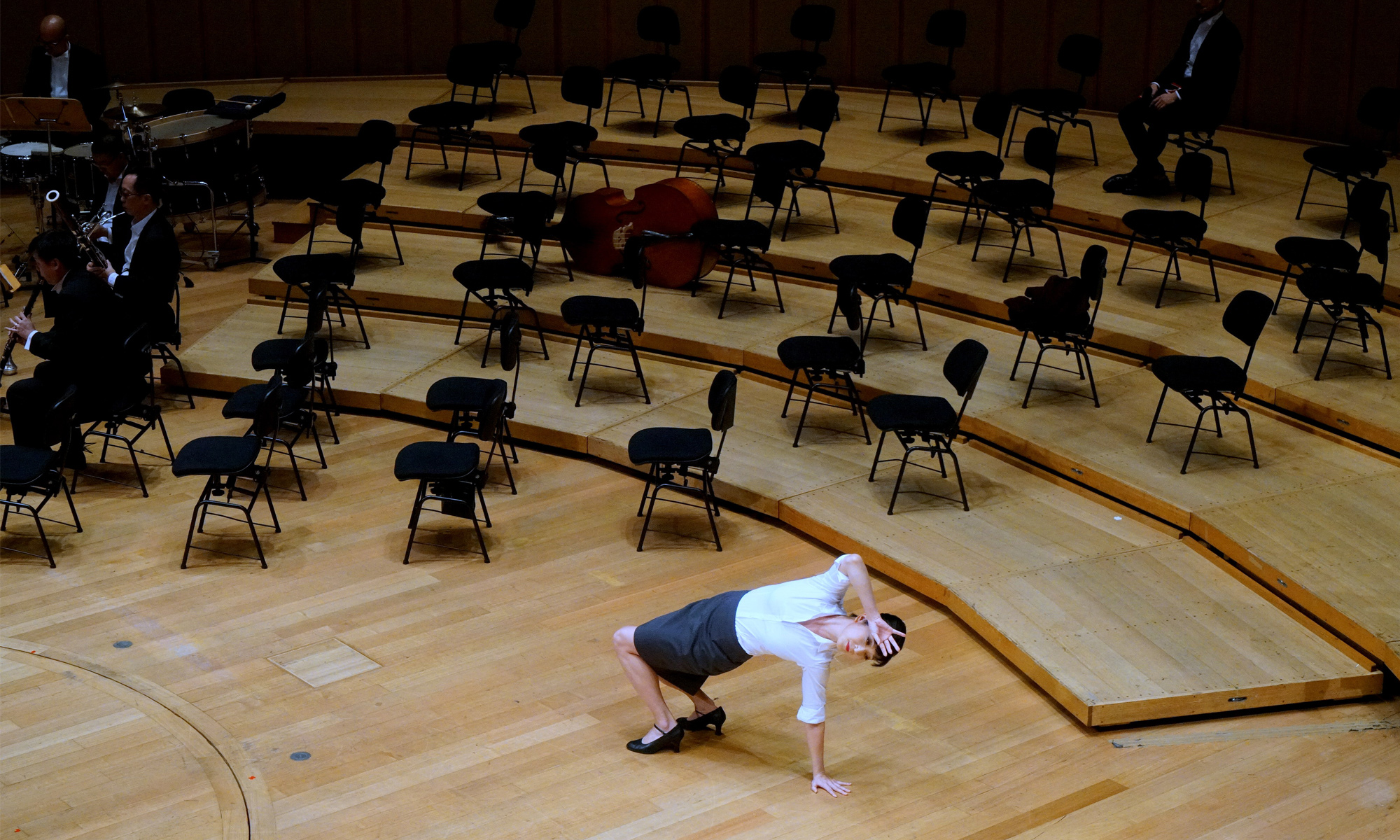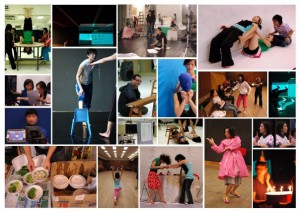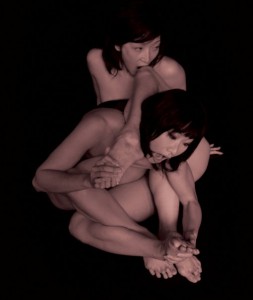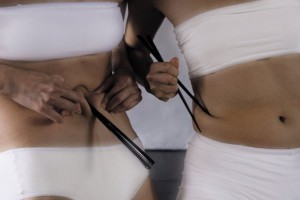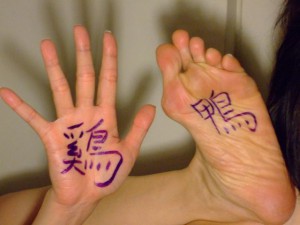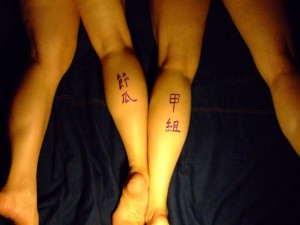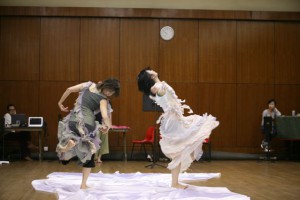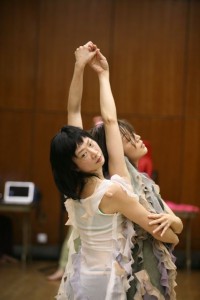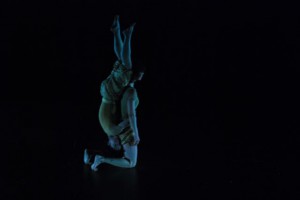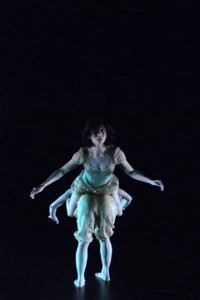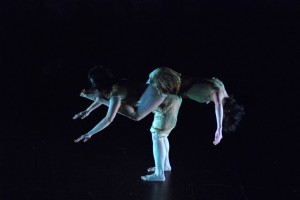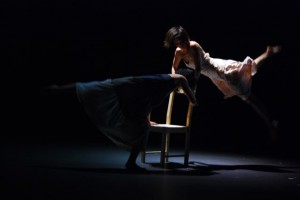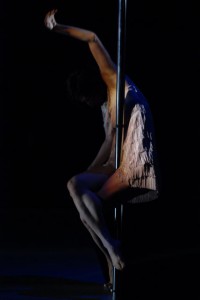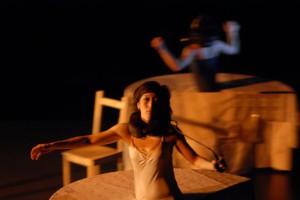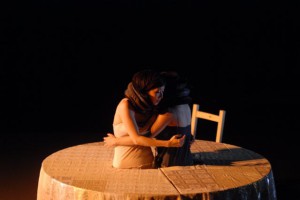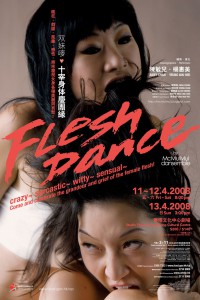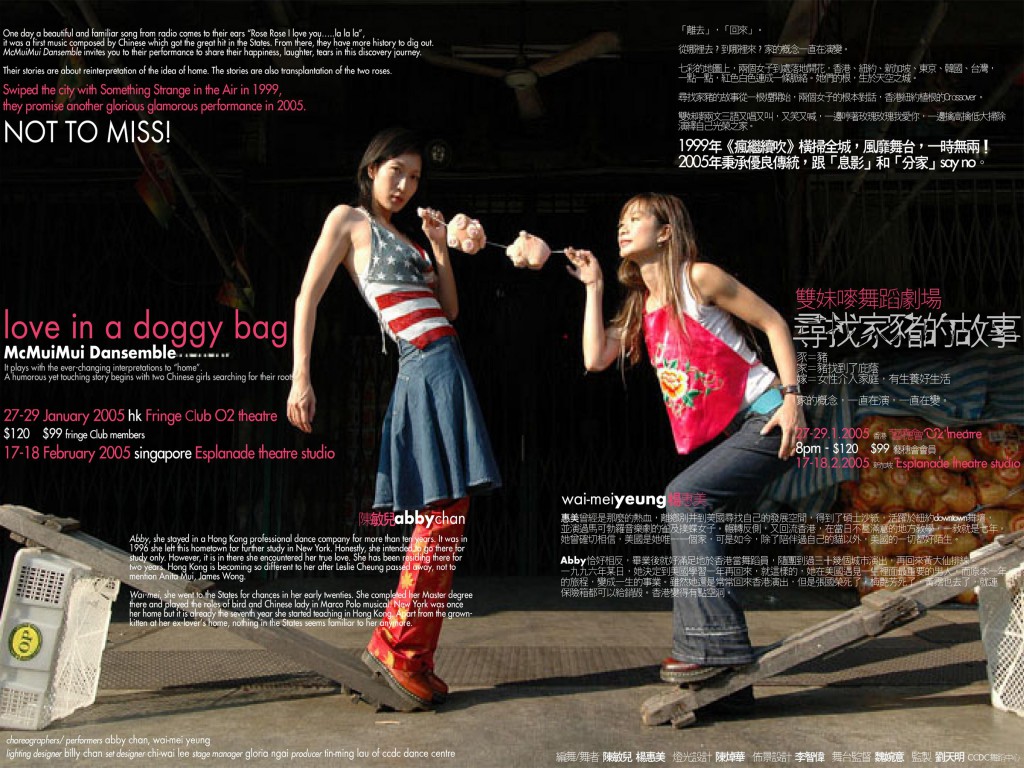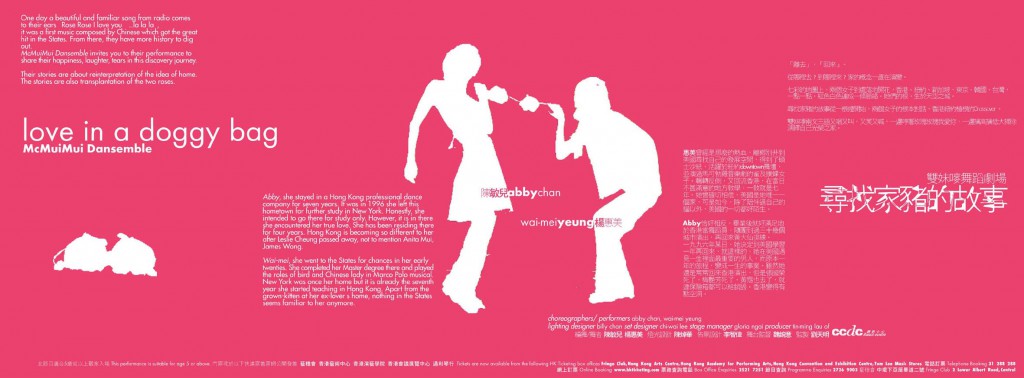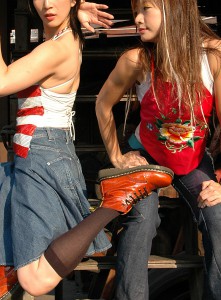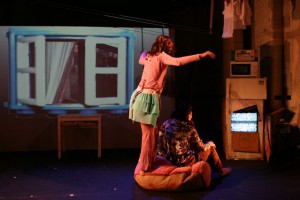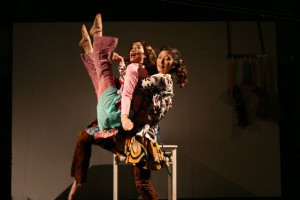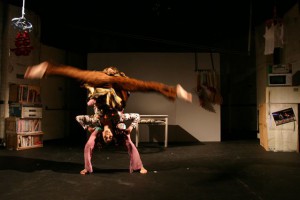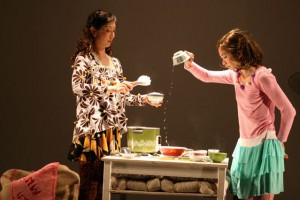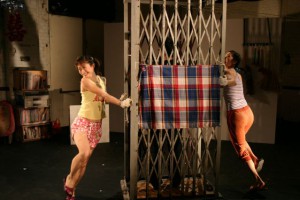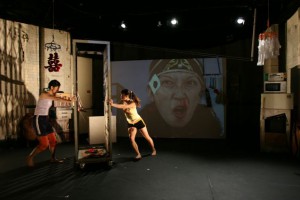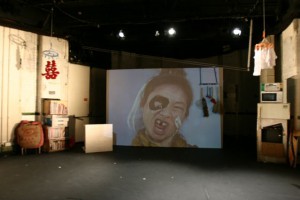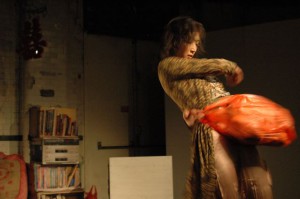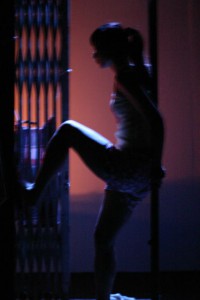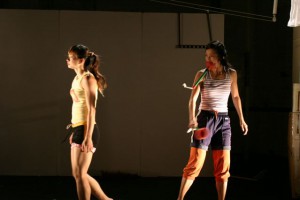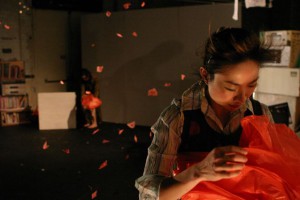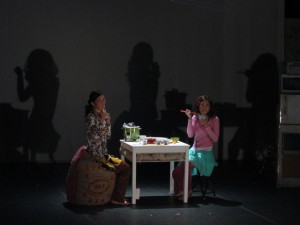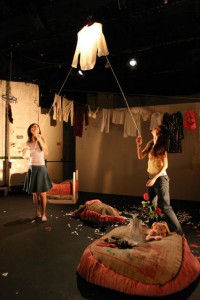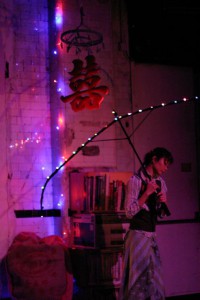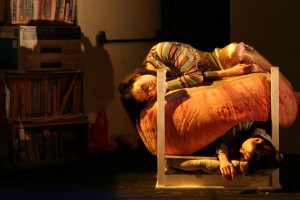Hong Kong Dance Alliance Award
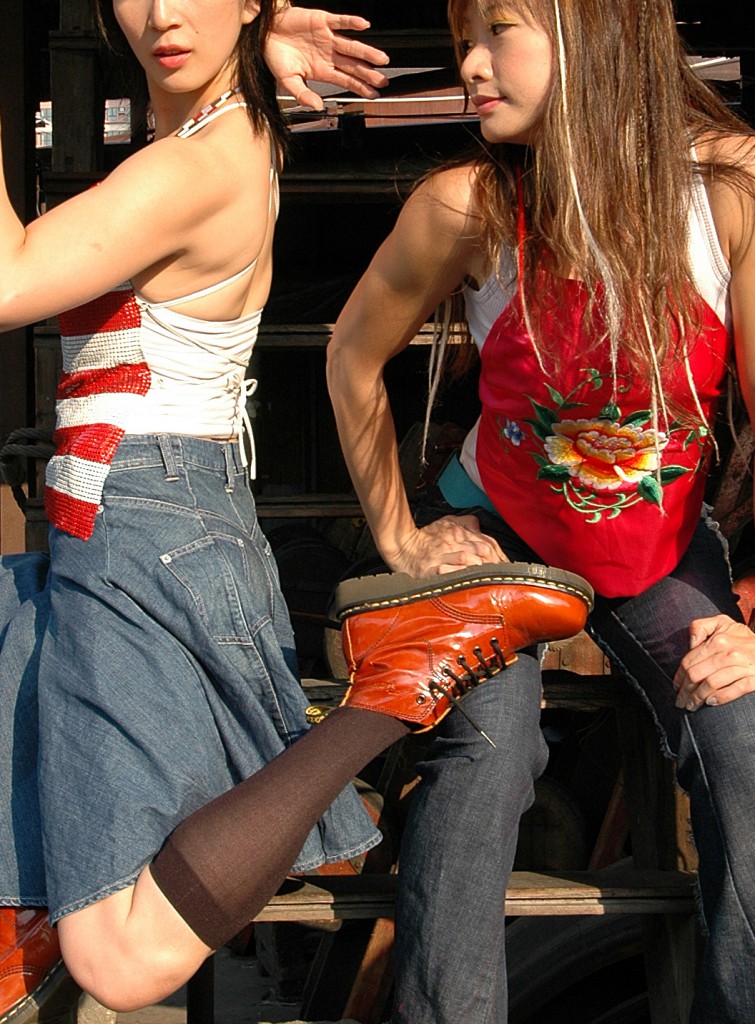
The Hong Kong Dance Award 2006 is presented to Abby Chan and Yeung Wai Mei, for their creations McMuiMui’s Love in a Doggy Bag.
In this madcap dance theatre production, Chan and Yeung, the quintessential thirty-something Hong Kong girls, revisit their roots and take us on a zany and nostalgic journey to growing up behind the folding gated door of a public housing flat.
Through a blaze of classic Mandarin torch songs, cantopop, and sop opera themes and amidst furniture that continually morphs from one use to another, Chan and Yeung present a deeply humanist and humorous portrait of paradise that could be every (wo)man’s childhood.
Killer toilet brushes and more
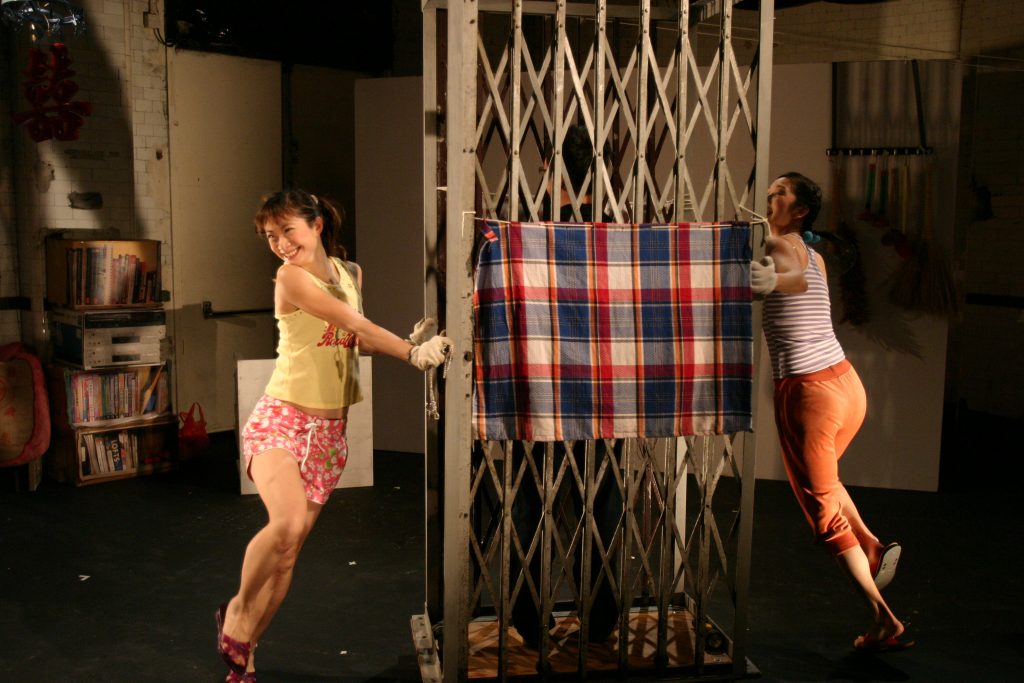
LOVE IN A DOGGY BAG
Esplanade Theatre Studio
Deng Fuquan
DOES anyone care much about Hong Kong these days?
Well, you might if you had lived there during the fast-changing 1980s like dancers Abby Chan and Yeung Wai-mei did.
The duo, who make up McMuiMui Dansemble, left for the United States in the 1990s – one to marry and the other to study. But they then discovered that their hearts still longed for Hong Kong. To deal with it, they conceived their 90-minute dance piece in 18 episodes which they called Love In a Doggy Bag.
Each episode riffs on jia, the Chinese word for family. Thus is Love part autobiography, part parody. In their performance here, the duo tried for honesty and frivolity, while avoiding overt political references. They made the stage a habitat gone topsy-turvy, with such things as toilet brushes turned killer weapons.
The women themselves were decked out in funky costumes and did mickey moves to a roulette of well-loved Cantopop classics, including those of the late Roman Tam.
Throughout their performance, they spoke in Cantonese, Mandarin and English as they explored community cultural codes evoking shared imagination and identity.
With conscientious flair and deadpan irony, they also created ample visual gags – like dinner scenes enacted as gong hustles and a spoof on family bonding in front of the telly – to express their trial of cultural dislocation.
Hong Kong Rhapsody
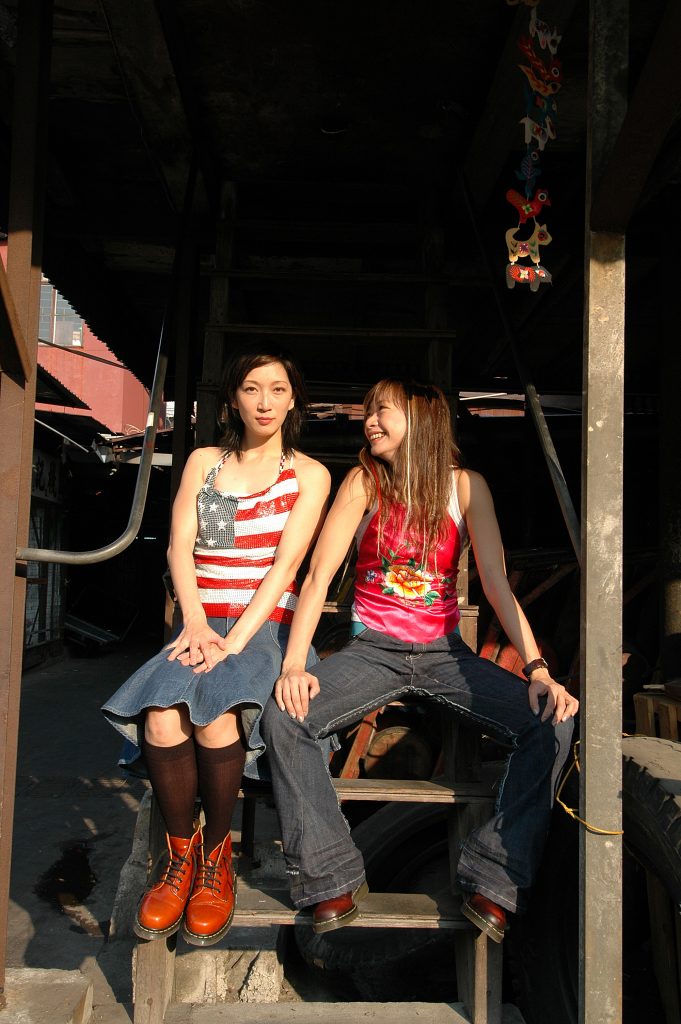
“The material may sound familiar, but how it was depicted and spoofed never felt mundane”
by Malcolm Tay
- Production – Love in a Doggy Bag
- Company – McMuiMui Dansemble
- Reviewer – Malcolm Tay
- Date – 16/02/2005
- Place – The Esplanade Theatre Studio
While watching Love in a Doggy Bag, I was mentally kicking myself, again and again, for not having a better grasp of Cantonese. I should have paid attention to those old television serials that my mother used to rent. Had I been more observant at the time, I would have been better equipped to enjoy this 90-minute offering by Hong Kong’s McMuiMui Dansemble. As it is, the show was still a hoot.
Much of its appeal, I think, stems from its deeply nostalgic story about two girls growing up in Hong Kong (the girls are played by McMuiMui founders Abby Chan and Yeung Wai-mei, who also choreographed the piece) and their shifting notions of home and identity. (This was Chan and Yeung’s way of understanding their yearning for Hong Kong after leaving for the United States in the 1990s.) The material may sound familiar, but how it was depicted and spoofed never felt mundane.
Love unfolds over 18 episodes – each episode plays on “jia”, the Chinese word for “family” – though keeping track of the line-up of episodes didn’t matter after a while. The setting for the duo’s display of quiet domesticity and comic horseplay is a lived-in abode with multipurpose furniture and a metal front gate near the theatre’s entrance, through which an usher made me pass before I took my seat. As it happens, Chan and Yeung were raised in the city’s public flats during the 1980s, which all have this sort of folding gate.
Both performers are graduates of The Hong Kong Academy for Performing Arts and their performance styles complemented each other: Chan was a stable, nurturing foil for Yeung’s impetuous passions. They had a kind of chemistry that perhaps only exists between old friends. You could see it when they danced together, deadpanned in perfect timing, or gaggled in a stew of English, Mandarin, and Cantonese. After all, Love was inspired by their own lives, so that personal connection between them, conveyed through the dance, was palpable throughout the evening.
The rough-cut choreography was more concerned with characterisation and mood than with academic precision, which agreed with Love’s rojak nature. Towards the end, a roving duet between the two girls – an ever-changing dialogue of wills and household objects, smacking of contact improvisation – aptly visualised their volatile relationship. At other times, they hustled and adjusted themselves to the music.
And what fitting music they chose. With Lau Tin-ming’s help, Chan and Yeung hit all the right spots with a winning soundtrack of classic tunes. The great songstress Yao Li’s 1940s Mandarin pop hit, Rose, Rose, I Love You, shared airtime with Frankie Laine’s lame English cover from the 1950s, along with Cantopop songs by Roman Tam and Nancy Sit. When TV soap opera theme songs accompanied a dinnertime send-up, we roared in recognition – it was that funny.
Lee Chi-wai’s set and props also did a fabulous job of evoking scenes from the characters’ memories. When stacked in columns, storage boxes turned into shelves, a stereo and a TV set. In near darkness, an upturned table lined with small candles became an open window from which to look out during a blackout – a respite from the humid chaos. Apparently, blackouts were common in Hong Kong’s public housing – and we haven’t forgotten last year’s island-wide incident either.
Indeed, Love used many props quirkily and effectively, but the significance of some items just failed to register in my mind. Take the stuffed pigs, for instance. They were damn cute but I wondered if they had any link with Love’s Chinese title, which literally means “The Story of Finding the Family Pig”. Or perhaps “pig” was someone’s childhood nickname. Maybe I missed a clue that was uttered in Cantonese, but it seemed as though some things were privately important to the dancers and were just beyond our grasp.
Still, I can’t wait for the McMuiMui girls to return to Singapore. Their work remains refreshingly honest and heartfelt, even when it gets unwieldy at times. If I ever watch them again, I’ll make sure my Cantonese is up to scratch.
2005 Love in a Doggy Bag 尋找家豬的故事
2005 Love in a Doggy Bag 尋找家豬的故事
瘋繼續吹 – 台北皇冠藝術節
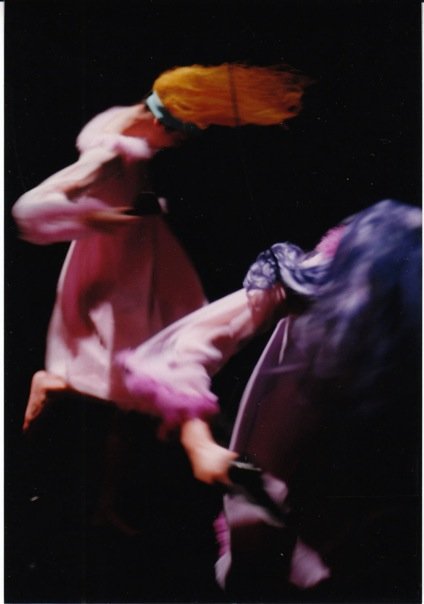
小心 ! 可別跌破你的眼鏡 ! 因為來自香港的俗辣雙人舞"雙妹嘜", 將在皇冠小劇場吹起一陣見怪不怪丶百無禁忌丶瘋狂爆笑的表演颶風 ……
文/ 謝文琦
頂著玉玲瓏式的俗艷假髮與墨鏡,足蹬高跟鞋丶身穿旗袍及手持摺扇,這個名為 “雙妹嘜” 的雙人舞團 (McMuiMui Dansemble) , 可能會讓想要正正經經看支舞的眾看倌們跌破眼鏡。
皇冠藝術節在五月登場的第五個演出團體 “雙妹嘜” , 是由年輕的香港編舞者陳敏兒丶楊惠美兩人所組成。這個團名在廣東話裡有"兩個女孩"(源自香港本地的某個老牌香水名稱)的意思,本著以"小女人"觀看這個"大世界"的心態而創作,作品名稱《瘋繼續吹》則是諧取自歌星張國榮的歌曲"風繼續吹"。只是此"瘋"非彼"風",於是乎,藉由電風扇、吹風機來表達出瘋狂的概念,透過一搭一唱的設計,再加上夕大雙人舞蹈的連綴,便成為這齣作品的基調。
見怪不怪
是的,這個融入說唱形式的作品,與其說是舞蹈,更不如說是戲劇;它藉由凸梯荒謬的喜感,巧妙地融合不同的元素,彌補不夠凝聚與內斂的肢體。索性,更誇張地羅織了香港在九七後光怪陸離的社會現象;說她們怪,她們的表演倒還真是"見怪不怪"一一不經意間剛好見證了香港這個城市的多變性格。
文化意象的拼貼也是它的特色。從伍佰到李宗盛的國語流行歌曲,從 Piazzola 的探戈到 J.S. Bach 的G弦之歌,都是配樂的靈感;中丶西雜燴,古丶今不分的假髮丶摺扇、水䄂、高跟鞋,全成了理所當然的趣味。幾個過場與反覆出現的熟悉旋律則是兒歌"王老先生有塊地"(英文原名為 Old McDonald has a farm),在歌詞中不倫不類地融合了英文單字和粵語"笑魁",將港產的無厘頭精神發揚光大。
百無禁忌
撇開語言的差異不談,對於類似的形式,小劇場的觀眾很難不去聯想到台北頗受矚目的小劇場導演魏瑛娟姊姊早期帶有"歌仔戲味"的雙女作品,對照之餘,不禁讓人產生無限的想像空間。還有,同為來自香港的編舞者,從前幾年執皇冠舞蹈空間兵符的彭錦耀的作品裡,也可見到類似百無禁忌的姿態。只見雙姝大玩特玩舞台跨界的遊戲,她們的肢體以通俗的語彙,展現出高亢的能量,身段靈活地模仿競選活動丶現場演唱,乃至於"説文解字"等等。
在二〇〇〇年舉辦的香港"歐亞舞蹈调網路會議:"中,這齣作品曾獲得著名舞評家,瑪沙 西格 ( Macia Sigel) 開懷大笑的激賞反應,以及六十多位各地策展人的肯定評價 一一 除了令人捧腹的笑料,以及港人對於自身處境的無奈幽默以外,即將在皇冠小劇場演出的《瘋繼續吹》,還會"吹"出什麼令我們驚艷的奇想火花呢?
(轉載自 567 期皇冠雜誌)
